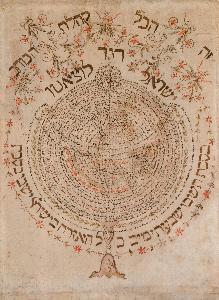Israel David Luzzatto
Israel Luzzatto;Israel David Luzzatto
Place: Padua
Born: 1707
Death: 1746
Biography:
Early Life and Education
Israel David Luzzatto, also known as Israel Luzzatto, was an Italian Jewish rabbi, kabbalist, and philosopher born in 1707 in Padua, Italy. He received classical Jewish and Italian education, showing a predilection for literature at a very early age.
Philosophical Contributions
Luzzatto is best known for his work in Kabbalah, a form of Jewish mysticism, and for his contributions to Jewish philosophy. His writings demonstrate mastery of the Tanakh, the Talmud, and the rabbinical commentaries and codes of Jewish law.
Notable Works
- Mesilat Yesharim, a philosophical and ethical treatise considered one of the classics of Jewish thought.
- Correspondence with other Jewish scholars, showcasing his role in the development of the Jewish Enlightenment in Italy.
- 150 hymns modeled on the biblical Psalter, written in classical Hebrew, which provoked criticism from rabbis but demonstrated his mastery of Hebrew language and poetic composition.
Artistic Influences and Connections
Discover the Beauty of Museo di San Marco (Florence, Italy), a religious complex located in Florence, Italy, which comprises a church and a convent that has been transformed into a museum. The convent was home to two famous Dominicans: the painter Fra Angelico and the preacher Girolamo Savonarola.
- Explore Discover the Beauty of Museo di San Marco (Florence, Italy), a must-visit destination for anyone interested in Renaissance art and history.
- Visit Israel David Luzzatto's page on Wikioo.org to learn more about his life, work, and contributions to Jewish philosophy and Kabbalah.
Legacy
Luzzatto's philosophical ideas were developed across the range of emerging religious movements, resulting in diverse contemporary Jewish attitudes to philosophical methods. His legacy continues to influence Jewish thought and mysticism.- Moshe Chaim Luzzatto on Wikipedia, providing a deeper understanding of his life and work.
- Explore the Biblioteca Medicea-Laurenziana, a hidden gem of Florence, which houses an impressive collection of manuscripts, early printed books, and other valuable documents.

